‘The most recommended place to visit’
Hull, along with Swansea Bay, Dundee and Leicester, has made the shortlist to become UK City of Culture 2017.
I love Hull. It is my city of birth and upbringing. I, along with many of my more ambitious counterparts, escaped in my 20s to live and work in the south of England. I lasted two years. As much as I enjoyed living near the bright lights of our nation’s capital, the pull of home – of Hull – was too much.
OK, we don’t live in Hull now, but being only a few minutes drive away and with our parents and siblings still there, it plays a major part in my and my family’s life. It has influenced who we are and how we see life. Hull runs through our blood like the eponymous river that splits the city in two clean halves.
 |
| The Holy Trinity Church |
Hull has a unique culture. It is built on years of industrialisation and subsequent de-industrialisation. Its people descended from those who built a life on its port location. I, like many of my past school friends and workmates, are descendants of trawlermen, dockers, and the wives who waited back home, not knowing if the latest trip would end in bad news or tonnes of fish to be gutted. Our strength and dry humour is our collective trademark.
Hull is firmly working class. Yes, there are some very middle-class areas with some wonderful Victorian architecture and wide avenues, but they rub up against Coronation Street-style terraces, and the 60s high rises where the slums once sat.
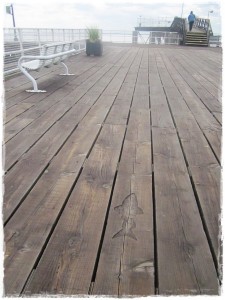 |
| Hull pier jutting out in to River Humber forms part of the fish trail. |
Hull is forever on the change. The war of 1939-1945 saw Hull being bombed mercilessly. Its enviable position on the instantly recognisable Humber estuary and superb trade links with Scandinavia and Western Europe soon became a huge disadvantage during the bombing raids. My childhood home was a 1960s semi erected in a space where a row of terraces once stood. Our house was one of four built to occupy a new class of workers, and they looked like they had just been parachuted into the terraces around them, much like the bombs that destroyed their predecessors and occupants only a couple of decades earlier.
My home could have looked out of place, but then Hull is like that – a mix of old and new. A glass fronted shopping centre stands in the dock where once thousands of eastern European migrants passed through on their way to the new world of the USA and Canada. A brand new theatre and shopping complex standing where the factories of the industrial hey-day have given way to the emerging service and leisure economies.
Hull has influenced a great many artist, whether through drama, music, or poetry. Hullites started The Housemartins, and then The Beautiful South. Philip Larkin wrote his prose from his office in the library of the city’s university, albeit not all complimentary to my native city. But then, he was an import, so what does he know?
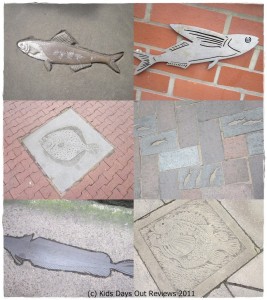 |
| The famous fish in the pavements |
Hull writers pen plays about working class life – have you seen Bouncers, or rubgy dram-com Up ‘n Under? If you have then you’ll have noticed the dry humour. The humour of everyday life. The humour that is typically northern, and uniquely Hull. Sport plays a big theme in Hull’s culture. Hull City have recently won the right to play amongst the great and good of English football and are deservedly holding their own. The investment in sport and sports facilities has been large, led by the local council and our home-grown telephone company KC. We grow from within – foreign investors although exist here, are a relatively new phenomenon.
Rugby, specifically Rugby League creates an atmosphere that splits the loyalties of families and unites us all at the same time. The rivalry between Hull FC (the black and whites on ‘that’ side of the river) and Hull KR (the red and whites over my ancestral side) creating anything and everything from light-hearted banter to hallowed turf we would protect with our lives, even if it meant severing contact with our own kin.
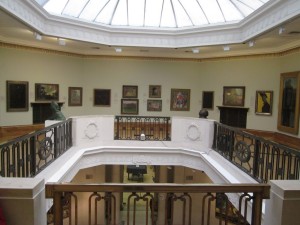 |
| The Ferens Art Gallery |
Hull has both the advantage and disadvantage of location – the term ‘out-on-a-limb’ is oft used. It’s a destination that’s too far to make it worth the bother. For less adventurous folk anyway. For those that make the effort to explore – whether they come here to study at the city’s esteemed university, or to see what others have been making such a fuss about – they find a city full of charm and warm-hearted humour with a lot to do.
The City of Culture title will mean massive exposure for Hull. We are ready. The city has made a real push over the last few years. We don’t wait for investors to turn up – we do it ourselves. There has been a real sea-change in the city centre with the retail centre moving slightly to give more of the deserved prominence to the cultural sectors. The old fruit market, once a decaying kind of place, is now thriving thanks to independent clubs and art spaces.
 |
| The Deep |
The Hull culture of benevolence and links via the sea to the wider world has created an annual Freedom Festival where all the arts come together to celebrate the freedom we have, and the freedom that’s yet to be granted to others. Hull is linked to the city of Freetown in Sierra Leone, and is the birthplace of William Wilberforce, the MP who is famed for having the willpower to push for the abolition of the Atlantic slave trade. While other British ports and industrial areas thrived on slavery and its products, a Hull man had the courage to step forward and say it had to stop. The Freedom Festival is an awesome tribute to those people who did their stuff to make sure we all have the freedom to party in the streets for a whole weekend if we want!
The City of Culture title will mean huge financial benefit – it has been estimated that every £1 spent by current City of Culture Londonderry has resulted in £5 back in to the city. Hull would benefit from a huge cash boost. Unemployment isn’t low. De-industrialisation has made us stronger, but strength doesn’t always bring in jobs. Hull is attracting new industries such as alternative energy, but for too many, these jobs can’t come soon enough. An economic boost based on its assets of a unique and strong culture and a welcoming character would be the sort of input Hull and its people would more than appreciate.
So why should you visit Hull?
Because you can visit the home of William Wilberforce. It is now a museum of his life, and of the slave trade he worked to stop.
Because there are all sorts of free museums, including Streetlife Museum, Hands on History, and The Hull and East Riding Museum. The Ferens Art Gallery is also free, befitting its benevolent benefactor Thomas Ferens, a founder of the international company now known as Reckitt Benckiser, and an MP who fought for the rights of women and girls in the colonies.
 |
| The Streetlife Museum celebrates Hull’s past |
Because we have never forgotten our cultural heritage and our strong links to the sea. We are proud of our world famous pavement fish trail, our Maritime Museum – housed in the building that was once the offices for the administration of eastern European migrants, helping them on their journey to a new life – and The Deep which shows our appreciation for fish, built on soil where once stood walls that protected our small, strong coastal town from attack.
Because our hotels and staff have the welcoming character in abundance and there is a growing choice of places to stay.
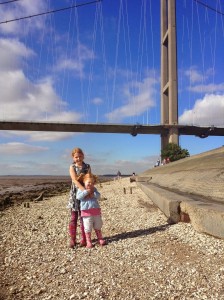 |
| To Hullites young and old, nothing means home more than the Humber Bridge. |
Because Hull is still one of the cheapest places in the whole of the UK. You can dine like a king and not need a king’s ransom. We don’t do kings here. Check your history books (or Google) for King Charles I and how Hull played its role in the Civil War of the 17th century if you don’t believe me. Hull has the red of Labour and working-class democracy at its core.
Because you can visit places like The Grafton Pub, The Welly, Blue Lamp, and Adelphi and see where people like Paul Heaton and Norman Cook, Everything But The Girl, and David Bowie’s Spiders From Mars would have stood and played.
Because you can take a trip to the theatre and see local culture at its best – the revamped Hull Truck Theatre is amazing and Hull New Theatre, a 1930s design which mercifully survived the attacks from the Lufftwaffe, has been faithfully hosting a range of home-grown and visiting professional and amateur shows for almost 100 years.
Because its the only place in Britain you will find white telephone boxes. True fact. We don’t need no BT here, thank-you very much.
Because you can play for hours in the free public parks. Our personal favourites are East Park and Pearson Park. Pearson Park being the gift of another great Hull philanthropist Zachariah Pearson, an international entrepreneur who eventually lost his fortune but had the sense to gift the land first.
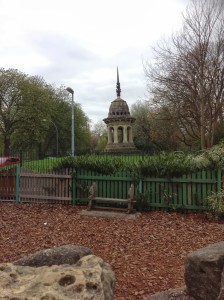 |
| Pearson Park |
Because we have the largest travelling fair in Europe which draws visitors from the rest of Yorkshire and beyond. You’re not from Hull if you have never had a bag of chips from the Bob Carver’s stall and taken a spin on the waltzers until you feel sick.
 |
| Hull Fair |
Whether Hull becomes the UK’s next city of culture is, for now, an unknown. We were rank outsiders. This year’s better-than-ever Freedom Festival and the roar that Hullites are making in the media, both online and off means that we are not outsiders any more.
You should visit. You really should.
The City of Culture 2017 will be announced in November 2013. For now, you can follow the progress of Hull’s bid on Twitter @2017Hull and on Instagram using #Hull2017. For more information, please visit Hull City Council’s website.
This article has been written to recognise the author’s contribution to travel and tourism by Avis Car Hire on the A-List Awards 2013.


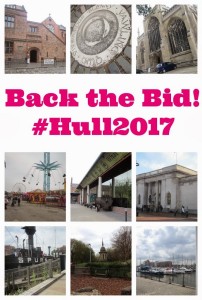
If you’d like to vote for this post in the Avis A-list awards! you can do so here…… http://www.avis.co.uk/blog/wp-content/plugins/wp-photocontest/viewimg.php?post_id=3659 🙂 thank you!